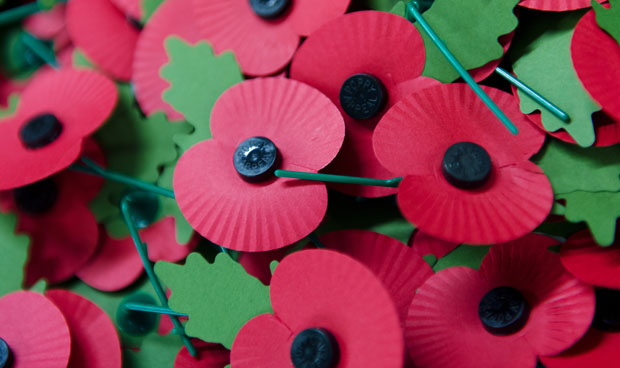How far-right Britain First has 'hijacked' remembrance poppy
Royal British Legion vows to 'take action' against the far-right party for misusing the red poppy symbol

A free daily email with the biggest news stories of the day – and the best features from TheWeek.com
You are now subscribed
Your newsletter sign-up was successful
Britain First has been accused of "hijacking" the red poppy and using it to increase its popularity and charity donations.
The far-right group has angered campaigners and veterans who say the use of the symbol on its website and social media pages is a "smack in the face" to the thousands of former service men and women who have sacrificed their lives for Britain.
The organisation, formed by former members of the British National Party, is a self-described "patriotic political movement," but they have been repeatedly accused of inciting violence against ethnic minorities, particularly Muslims.
The Week
Escape your echo chamber. Get the facts behind the news, plus analysis from multiple perspectives.

Sign up for The Week's Free Newsletters
From our morning news briefing to a weekly Good News Newsletter, get the best of The Week delivered directly to your inbox.
From our morning news briefing to a weekly Good News Newsletter, get the best of The Week delivered directly to your inbox.
"Britain First are violent thugs and they can have no claim on this symbol," writes former army veteran James Wharton in The Independent. "By selling items branded with the poppy, Britain First is raising money to promote values that our military men and women have died to defeat."
The red poppy is a registered trademark of the Royal British Legion and is not allowed to be used for political or partisan use, not can any other organisation profit from its sale.
The Legion says it has repeatedly warned the political group about their "misuse" of the symbol. However, "the activity has continued and the Legion will be taking further action", a spokesperson told the charity news site Third Force Watch.
Britain First is by far the most popular political party on Facebook, reports the Daily Mirror, which has analysed its social media output. The group claims to be able to reach up to 20 million people – a third of the UK's population. Campaigners argue that it uses military symbolism to boost its audience numbers across social media.
A free daily email with the biggest news stories of the day – and the best features from TheWeek.com
"They share these images to trick people into liking and sharing and therefore increasing their reach on Facebook," a spokesperson from the opposition group Exposing British First told The Independent. It says many people are unaware that the remembrance messages they are sharing are from a far-right group.
"Britain First differs from your classic two-bit paramilitary hate group in one crucial way - they have developed a formidable social media presence and are using it to scoop up charitable donations," writes Willard Foxton in the Daily Telegraph.
This is not the first time Britain First has faced criticism for associating themselves with a campaign. In the 2014 European election it used the phrase "Remember Lee Rigby" on its ballot papers in Wales. His mother responded with outrage, saying: "Their views are not what Lee believed in and [have] no support from the family".
The British Legion advises customers to make sure the products they purchase are official poppy merchandise supplied through their licensed partners or from www.poppyshop.org.uk
-
 The environmental cost of GLP-1s
The environmental cost of GLP-1sThe explainer Producing the drugs is a dirty process
-
 Greenland’s capital becomes ground zero for the country’s diplomatic straits
Greenland’s capital becomes ground zero for the country’s diplomatic straitsIN THE SPOTLIGHT A flurry of new consular activity in Nuuk shows how important Greenland has become to Europeans’ anxiety about American imperialism
-
 ‘This is something that happens all too often’
‘This is something that happens all too often’Instant Opinion Opinion, comment and editorials of the day
-
 How corrupt is the UK?
How corrupt is the UK?The Explainer Decline in standards ‘risks becoming a defining feature of our political culture’ as Britain falls to lowest ever score on global index
-
 The high street: Britain’s next political battleground?
The high street: Britain’s next political battleground?In the Spotlight Mass closure of shops and influx of organised crime are fuelling voter anger, and offer an opening for Reform UK
-
 Is a Reform-Tory pact becoming more likely?
Is a Reform-Tory pact becoming more likely?Today’s Big Question Nigel Farage’s party is ahead in the polls but still falls well short of a Commons majority, while Conservatives are still losing MPs to Reform
-
 Taking the low road: why the SNP is still standing strong
Taking the low road: why the SNP is still standing strongTalking Point Party is on track for a fifth consecutive victory in May’s Holyrood election, despite controversies and plummeting support
-
 What difference will the 'historic' UK-Germany treaty make?
What difference will the 'historic' UK-Germany treaty make?Today's Big Question Europe's two biggest economies sign first treaty since WWII, underscoring 'triangle alliance' with France amid growing Russian threat and US distance
-
 Is the G7 still relevant?
Is the G7 still relevant?Talking Point Donald Trump's early departure cast a shadow over this week's meeting of the world's major democracies
-
 Angela Rayner: Labour's next leader?
Angela Rayner: Labour's next leader?Today's Big Question A leaked memo has sparked speculation that the deputy PM is positioning herself as the left-of-centre alternative to Keir Starmer
-
 Is Starmer's plan to send migrants overseas Rwanda 2.0?
Is Starmer's plan to send migrants overseas Rwanda 2.0?Today's Big Question Failed asylum seekers could be removed to Balkan nations under new government plans
